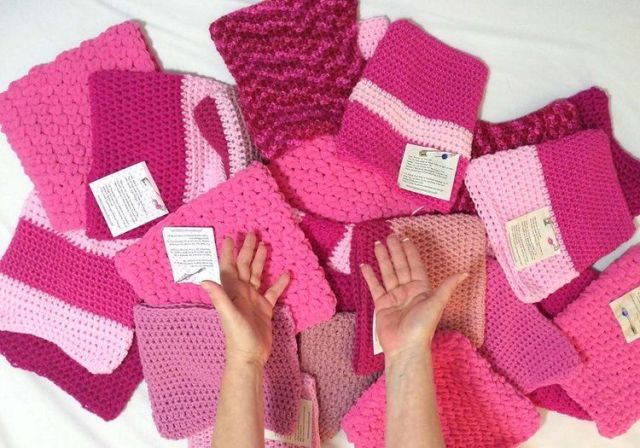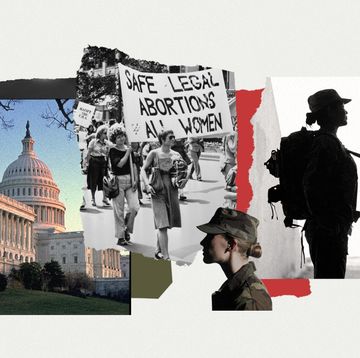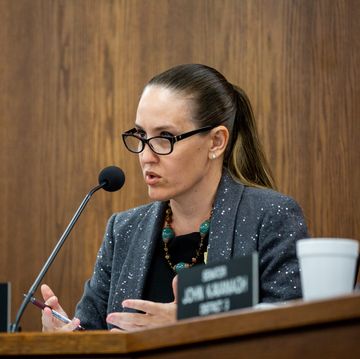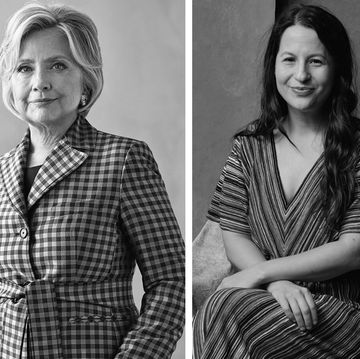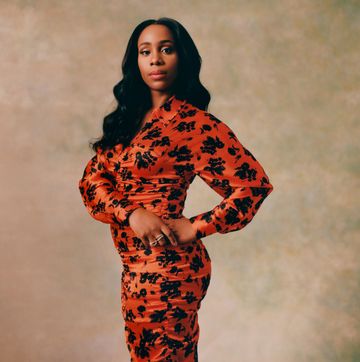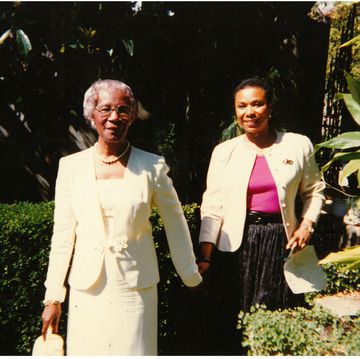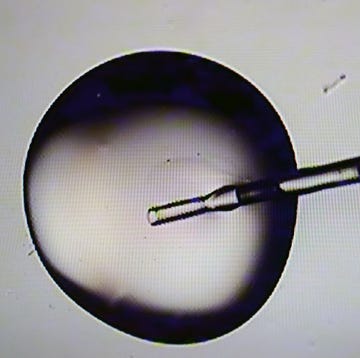The weather is supposed to be unusually warm in Washington, D.C. this weekend, but over 60,000 women are expected to show up there in knitted "pussy power" hats, anyway.
Festooned in cat ears and crafted from hot pink yarn, the hats are the creation of Krista Suh and Jayna Zweiman, friends who wanted to come up with just one more way for women to announce their opposition to Donald Trump's election.
Suh, a screenwriter in Los Angeles, said she wanted to turn her despair over Hillary Clinton's loss into a positive contribution to the then-nascent protest over the inaugural weekend. "Honestly, I would have stripped naked for it if that would have been impactful," she says. But knowing that temperatures in D.C. tend to be lower than those in L.A., she decided she could make herself a hat—easy, warm, and, most importantly, visible. She knit hers first, but soon realized that if more people participated, "we could all wear them, make a unified statement." She recruited friends to help work out the logistics, launching less than three weeks after the election. Online, Suh and Zweiman have posted an official pattern and a few more for women who want to customize their efforts.
The hats have generated not only extraordinary attention, but widespread participation. By the first week of January, Suh estimates that over 60,000 hats had been knitted for the march, either for the knitters themselves or for fellow protestors. At this point, she expects that number has since grown. But what excites Suh even more than the numbers or the press is the spread—it's not only activist-minded millennials or baby boomers who've picked up a pair of needles. Suh has heard from women in their teens and women in their 70s, at least one woman who's 99, and several dozen more who've never participated in a protest in their lives. Somehow, they've all found common cause over a pussy-shaped pattern and hot pink thread. Even Planned Parenthood Cecile Richards seems to have found some solace in the "meditative" process.
Of course, not everyone is into Barbie-colored cat ears. "I feel like we're missing the point a little bit by making this into something cutesy," says Holly Derr, a writer and director who's put on several productions of the Vagina Monologues and specializes in performances of gender. "I totally understand the desire to make a strong visual statement, but I think that many women marching together is already a strong visual statement." A more effective effort, Derr says, could have invited women to each knit a hat that looks like her own vagina—literally. "I always welcome that," she says. "Because the more distance we put between ourselves and our bodies, the easier it is to violate them." Derr envisions hundreds of thousands of "maybe hair and grizzly" vagina hats.
Andi Zeisler, the co-founder of Bitch Media and author of We Were Feminists Once, says she feels somewhat at odds with a feminist movement that makes cheery accessories into its visual symbol. "I do feel like this is the time for getting scary," she says. "We need to go full witch. We need to really scare some folks." What we face now in Congress, in the White House, in State Legislatures nationwide—"it's not cutesy at all, no matter how you look at it. It's terrifying," Zeisler says. "I do worry that as a physical optic, mass pink pussycat hats might not have the effect that something darker and scarier and more urgent might have."
And yet despite her reservations, Derr admits that any initiative that encourages more women to see themselves as feminists is good. "What I really want is for all the women for whom this is the first time that they've ever really done something political to continue on with that," she explains. "The march or this hat is step one. Once that's over, we have a lot of work to do." Zeisler is cautiously optimistic that the thousands of women who are exposed to political activism for maybe the first time this weekend, via knitted hats or otherwise, will continue to make their voices heard over the next four years and beyond. "If people take this as an entry point and then take it to the next level, then, yes, that t-shirt or that necklace or that feminist deodorant, even, is good," she says.
Zweiman emphasizes that she, too, hopes this effort will be the first of many actions women take to protest the Trump administration. "We really would like...to see people build on these really great connections that they're making," she says. But to start, she and Suh believe women need "to turn our frustration into something real." The fact that these hats, whatever you think of them, are made of material women can "physically see and hold in their hands" is crucial.
Besides, Suh adds, this initiative isn't triumphalist. The hats were never intended to be feminist trophies for the women who wear them. Instead, each is "absolutely a conversation starter," Suh insists. She and Zweiman refuse to accept that a symbol of the resistance must be "plain" or "serious" in order to be effective. "It's very unapologetically feminine," Suh says. And she has little patience for a version of feminism that maintains there's only one or two ways to perform it properly, worse still to perform it in a way that will make men "respect" it.
"A feminist can wear whatever she wants," Suh says. "You can still be politically active while you're wearing thigh-high boots" or a miniskirt or a hat with cat ears. "Choosing to be part of this project," she says, "means choosing to be part of a project where thousands of women are supporting each other and standing up for each other and representing themselves."
